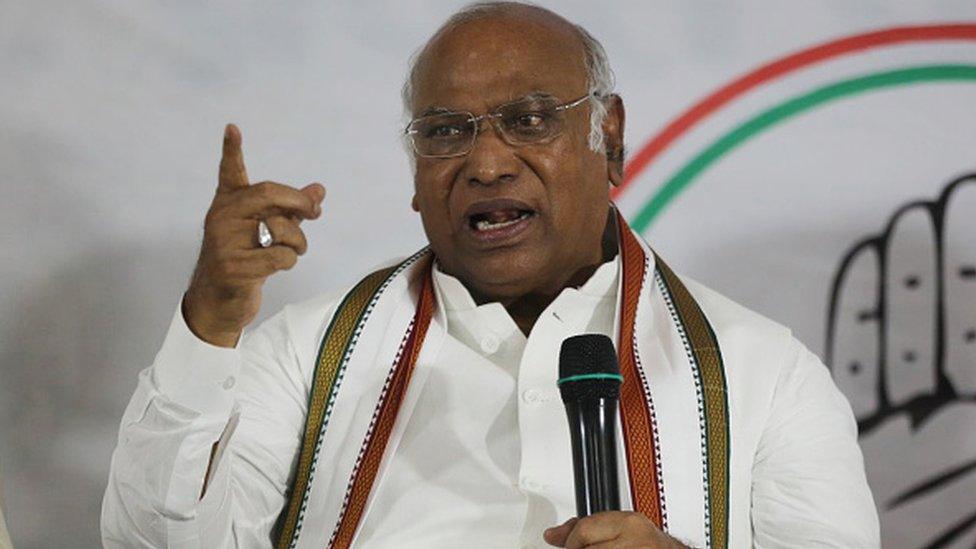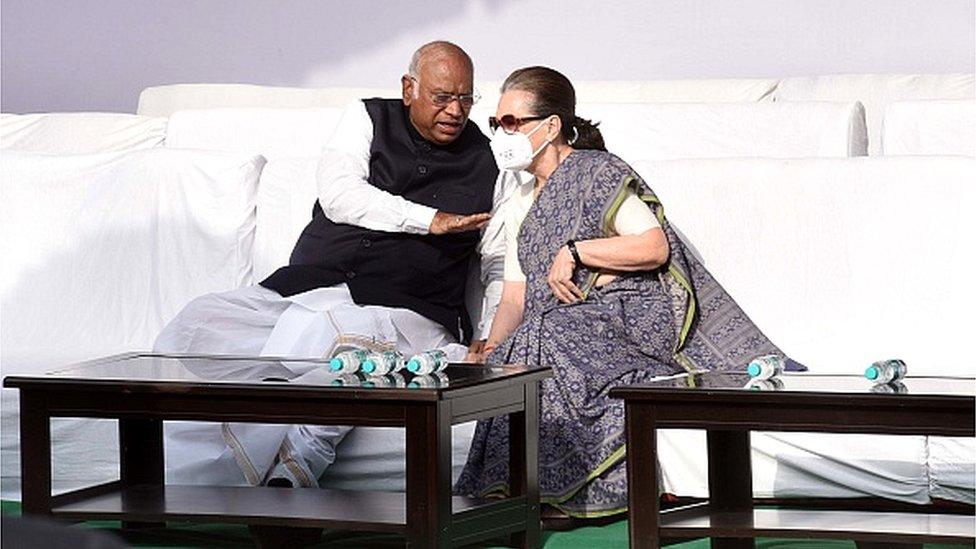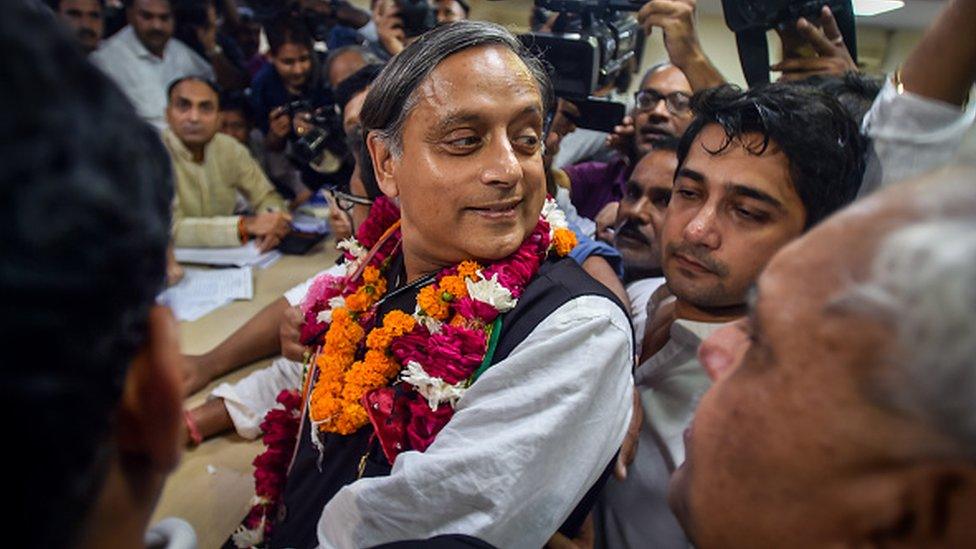Mallikarjun Kharge: Can a non-Gandhi Congress chief take on Modi?
- Published

Veteran politician Mallikarjun Kharge has won the internal election to become the president of India's main opposition Congress party.
Mr Kharge was competing against charismatic MP Shashi Tharoor, but swept the election, securing eight times more votes, external than his opponent.
As he congratulated Mr Kharge on Wednesday, Mr Tharoor said, "I believe the revival of our party has truly begun today."
This is the first time in more than 20 years that the party will have a non-Gandhi at the helm - the last such chief Sitaram Kesri was unceremoniously removed in 1998 just after two years into his five-year term.
He was replaced by Sonia Gandhi - widow of the late PM Rajiv Gandhi - who then served as the party president for 19 years. Her son Rahul Gandhi was elected unopposed in 2017, but he stepped down two years later owning responsibility for the party's rout in the 2019 general elections. Since then, Mrs Gandhi has been heading the party as the interim chief.
The election of Mr Kharge, a loyalist of the Gandhi family, was widely expected.
A former federal minister, Mr Kharge had announced plans to implement the organisational reforms in the party, including 50% representation for those below 50 years at all levels.
In his new role, the 80-year-old veteran will be expected to hit the ground running - the next general elections are due in just a little over 18 months and experts say the Congress party needs reforms to take on Prime Minister Narendra Modi's Bharatiya Janata Party (BJP).
And it will be his job to provide leadership to the party as it faces its worst crisis "structurally, organisationally, and even in terms of ideological leadership".
Who is Mr Kharge?
A member of the Dalit (formerly untouchable) community from the southern state of Karnataka, Mr Kharge has had a long stint in public life.
Born in 1942 in Bidar district, he grew up in the neighbouring district of Gulbarga after his family moved there. He studied law and represented labour unions in his early days. He took an active interest in politics from his students days and joined the Congress party in 1969.
Devaraj Urs, who was then the party chief in the state, convinced him to contest from Gurmitkal, an upper caste-dominated constituency in 1972. The leap of faith paid off - Mr Kharge won from that constituency nine consecutive times. He also contested - and won - from Chitapur.

Mr Kharge is a loyalist of the Gandhi family
"He has emerged as a Dalit leader, but he has been very fair-minded with all other communities as well," political analyst Indudhara Honnapura told BBC Hindi.
An astute administrator, Mr Kharge served as minister in several state governments.
"He was always polite with officials but had a mind of his own and would make clear his preferences," a retired bureaucrat said.
In 2009, he moved to the political centre-stage in Delhi when he was elected from Gulbarga constituency for the first time to the Lok Sabha - the lower house of the parliament. He won a second term in 2014 but lost to the BJP candidate in 2019. In 2021, he was elected to the upper house.
The veteran politician has done stints as the leader of the opposition in both houses of parliament and served as a cabinet minister in the federal government looking after the railways and labour and employment ministries.
But the current assignment is expected to be the toughest of his career - the rise in the fortunes of the BJP under the leadership of Mr Modi and party president Amit Shah since 2014 has coincided with the downslide of the Congress party.
In the 2019 elections, the Congress won only 53 seats as the BJP swept the elections with 303 seats in the 545-member house.
The party has also lost power in the majority of the states it once ran and is now restricted to two states.
Can he challenge the BJP?
Analysts say he will have to overcome several challenges to take on the BJP.
To begin with, he will have to prove that he's not just a proxy for the Gandhi family and is actually in control of the party.
In the run up to Monday's vote, he told the Indian Express newspaper, external that he may not consult the Nehru-Gandhi family on every decision, but would seek their "guidance" and "suggestions" since the Gandhis had experience helming the party.
Then, he will have to deal with dissensions within the Congress - in recent years, several senior leaders have either deserted the party or expressed their unhappiness with the way it's run.

The only other candidate in the fray was the charismatic Shashi Tharoor, a diplomat-turned-politician
Political commentator Kay Benedict says Mr Kharge "is quite efficient in soothing ruffled feathers and reducing tensions between different factions. He is not someone who will fight with others".
But some are wondering whether a politician from southern India will have much appeal in northern states such as Uttar Pradesh and Bihar - which together elect 120 MPs and where the party is in a shambles.
Journalist Poornima Joshi says "he does not have the dynamism" to give a fresh edge to the party nationally.
"He is a decent man and a rooted politician. No-one can call him a lightweight. But in terms of reinvention of the Congress, Mr Kharge does not exactly fill the vacuum that exists in the party."
Ms Joshi also says it's unlikely that he will be able to challenge the Modi-Shah combine.
"The Congress needs someone who can speak their lingo, someone wily, someone who can beat the BJP at their own game."
But, Ms Joshi says, perhaps the new Congress president "can fight the BJP ideologically".
"And people may respond to him positively once they compare the two sides. This is a factor that is yet to be seen."

Read more India stories from the BBC:
